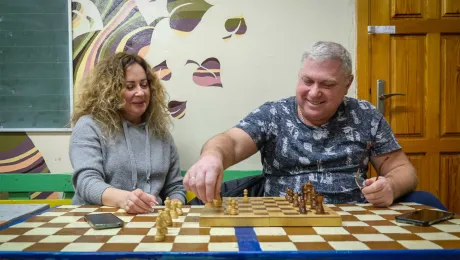Ethiopia continues to receive people that flee conflict and violence in Sudan. The newly established refugee camp Kumer, 70 kilometers from the border crossing in Metema, hosts almost 8.000 people but lacks the most basic items and services.
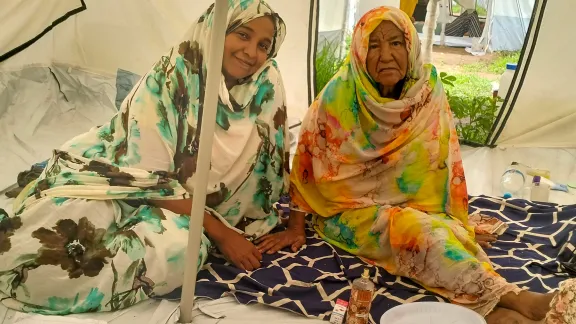
Dr Samah Kail Hussein and her mother at the Kumer refugee camp in the Amhara Region, Ethiopia. Photo: LWF/C. Masanga
Insufficient food and drinking water and overcrowded shelters at the Kumer refugee camp
‘’I never thought I would one day be a refugee,” says Dr. Samah Kail Hussein. A medical doctor at the Khartoum military hospital, she now finds herself at the Kumer refugee camp, 70 kilometers behind the Ethiopian border, together with her ailing mother.
The outbreak of the conflict in Sudan in mid-April turned Samah’s life upside down. She stopped going to work when the security situation became worse, and together with her mother, she stayed in different parts of the town, always looking for a safe place. Eventually, they packed a change of clothes and medication and journeyed four days to Metema at the border of Ethiopia. The journey took long days, and Samah and her mother were hungry and feared for their safety.
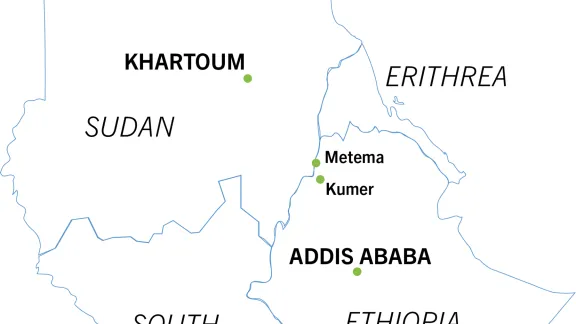
The journey of Samah and her mother, from the Sudanese capital Khartoum to Kumer refugee camp. Graphic: LWF/ S. Gallay
Essential services needed
The crisis in Sudan has forced close to 3 million people to leave their homes. Two million are internally displaced, and more than 700,000 people have left Sudan since the beginning of the crisis in mid-April. Twenty-five thousand of them went to Ethiopia. The Kumer refugee camp hosts 7.659 people, while the remaining refugees are still in the transit centers, waiting to be relocated to the camp.
According to the UNHCR Office in the region, the Kumer refugee camp, set up in June 2023, is facing an acute shortage of essential services: There is not enough food or clean water, shelters are overcrowded, and there are no health services. Samah’s mother, who has diabetes, has not received insulin since the conflict started.
There are not enough toilets, and the start of the seasonal rains created a lot of stagnant water, where mosquitos breed. The camp is at risk of waterborne diseases.
I need medical treatment for my mother, but I also wish to use my skills to help my fellow refugees.
– Dr. Samah Kail HUSSEIN, a refugee from Khartoum
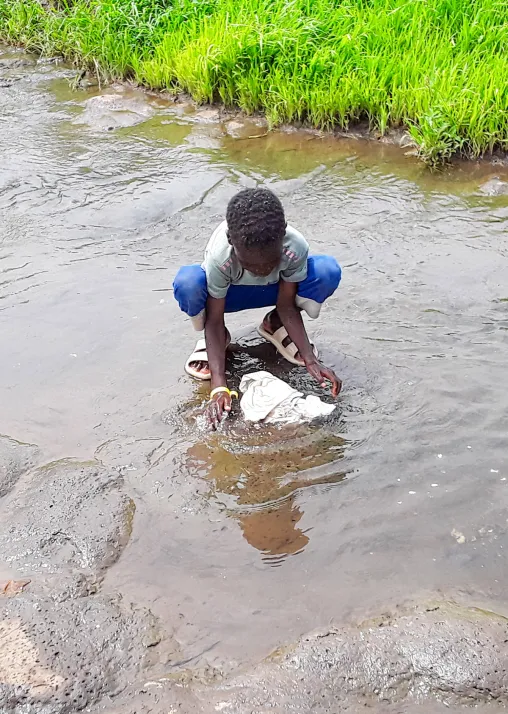
A boy washes a shirt in Kumer refugee camp. Because of the seasonal rains, the camp is flooded. The muddy water is the only water source people have at the moment. Photo: LWF/C. Masanga
LWF will distribute relief goods, sanitation items and cash to alleviate the most urgent needs. “With more funding, we would establish a water system in the camp,” says Sophia Gebreyes, LWF Country Representative in Ethiopia. Insufficient amounts of drinking water are brought to the camp by truck. “Right now, many people are using the muddy river water running through the camp to wash and cook.”
Food supply is another critical issue at the moment. With aid deliveries suspended, the organization distributing food now can only do so until the end of the month. LWF has joined churches and partners in Ethiopia in calling upon USAID and WFP to reinstate food aid to Ethiopia.
Samah, the doctor from Khartoum, is already planning to help improve the situation at the camp. “I need medical treatment for my mother, but I also wish to use my skills to help my fellow refugees,” she says.
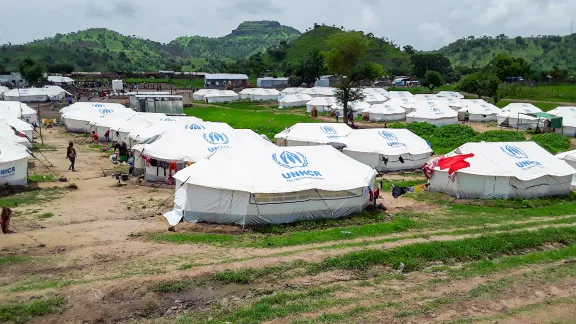
Kumer camp has been set up to relieve the transit center in Metema, but is currently overcrowded. Photo: LWF/C. Masanga
ACT Alliance issued an appeal for the Sudan Crisis on 8 June 2023 and receives contributions until 31 December 2023. Act Church of Sweden, the Australian Lutheran World Service, Icelandic Church Aid, and the Ministry of Foreign Affairs of Iceland support LWF’s work with Sudanese refugees in Ethiopia.
